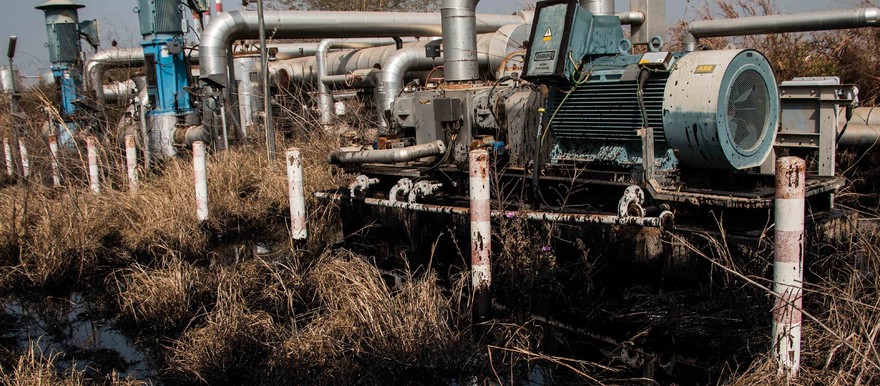This report is part of an exclusive series, ‘War Economy’, which focuses on the economic situation in South Sudan.
South Sudan has suffered huge production losses amounting to about 20 million barrels of crude oil as a result of the 15-month shutdown of oil production in Unity State.
The conflict has also caused economic and environmental damages that are irrecoverable at least in the near term, according to industry analysts and geologists.
Two major international consortia were working in Unity State prior to December 2013. Pre-war production by Greater Pioneer Operating Company was reportedly about 37,000 barrels per day and production by Sudd Petroleum Operating Company was 4,600 bpd.
The companies halted production on 22 December, possibly earlier in some areas. This means they have missed so far about 463 days of production. A calculation based on the pre-war production level of 41,600 bpd shows that lost production amounts to 19,260,800 barrels since oil production stopped.
By another estimate, 45,000 barrels per day were produced at fields in Unity State prior to the war. This figure comes from the US Energy Information Administration, which collects and analyses data on global oil production and trends.
Based on that figure, the total lost production since December 2013 tops 20 million barrels of oil.
However, even this estimate may be too low, given that the South Sudanese government itself claimed 70,000 bpd production from the Unity State fields in September 2013.
These estimates also do not account for production cuts at the oil fields in Upper Nile State, where production has continued uninterrupted at some wells but with interruptions at others.
‘Permanent damage’
Besides the immediate production losses, the civil war has also compromised future production by severely damaging oilfield infrastructure and by making investors more reluctant to reinvest in the area.
An ill-managed shutdown in 2012 during a dispute between Sudan and South Sudan had already partially damage some oilfield infrastructure. Analysis published by the US energy agency last year stated that a portion of production was “compromised because of technical issues surrounding the shut-in and its duration.”
“As a result, EIA assumes that… the country’s production cannot recover to its pre-shut-in 2011 average level of 340,000 bbl/d at least in the near term because of permanent damage and natural decline, particularly at mature fields in Unity state.”
Expressing a similar view, Luke Patey, a researcher and author of ‘The New Kings of Crude,’ explained that oil companies are now unlikely to bring advanced equipment to Unity State, even though this equipment will be needed in order to sustain production levels at the aging oil fields.
“Output levels at Unity state oilfields were already in steep decline before the conflict… A Norwegian study found that the oil recovery rates could be pushed up, and generate billions in new revenue, but the investment in technology was estimated to cost up to $300 million for a single field. Oil companies will be reluctant to sink sizable new capital investments in such a politically instable environment where security risks have grown.”
“As a result, the current conflict is likely to precipitate the decline of South Sudan’s oil production… crippling South Sudan’s oil industry for years, if not decades,” Patey wrote in an article published last year.
Irreversible damage to the water table
A recently published scientific study stated that oil production at Thar Jath and Mala fields in Unity State has polluted groundwater in the area to such an extent that it is no longer safe for human consumption.
A team of South Sudanese and German geologists found oil exploration in Unity State has made groundwater used by 180,000 people too salty to drink, and has contaminated the water with dangerous amounts of heavy metals.
Speaking last month at the University of Juba, the study’s lead author geologist Hella Rueskamp said, “You won’t even cook your noodles with that water. It is terrible.”
“The environmental damage is done. We cannot change things and we have to use alternative water sources,” Rueskamp said. “In these areas there is no chance to clean this first water table. You lost it completely.”
The study was published in the peer-reviewed German journal Zentralblatt fur Geologie und Palaontologie. The field research was conducted prior to the current conflict. Since then, new oil leakages are reported owing to damage caused by fighting or lack of maintenance.
Photo: Sudd Petroleum Operating Company equipment leaking oil at Thar Jath oilfield, Unity State, February 2015
Read more from the seres ‘War Economy’:
Kiir’s office spends more than budget of an entire state (28 March)
Secrecy around South Sudan’s dwindling central bank reserves (28 March)
South Sudan’s Lakes police paid 2 months late (27 March)
Bread price rises in South Sudan state capital (27 March)
South Sudan fiscal report delayed after Q1 overspend (27 March)
South Sudan denies printing more money (27 March)




